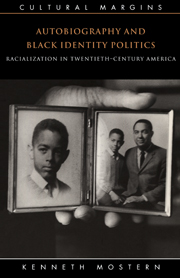Book contents
- Frontmatter
- Contents
- Acknowledgments
- Part one: Theorizing race, autobiography, and identity politics
- Part two: The politics of Negro self-representation
- Part three: The dialectics of home: gender, nation, and blackness since the 1960s
- 6 Malcolm X and the grammar of redemption
- 7 The political identity “woman” as emergent from the space of Black Power
- 8 Home and profession in black feminism
- Notes
- Works cited
- Index
8 - Home and profession in black feminism
Published online by Cambridge University Press: 02 December 2009
- Frontmatter
- Contents
- Acknowledgments
- Part one: Theorizing race, autobiography, and identity politics
- Part two: The politics of Negro self-representation
- Part three: The dialectics of home: gender, nation, and blackness since the 1960s
- 6 Malcolm X and the grammar of redemption
- 7 The political identity “woman” as emergent from the space of Black Power
- 8 Home and profession in black feminism
- Notes
- Works cited
- Index
Summary
I think that a whole lot of what's going on in my work is a kind of theorizing through autobiography or through storytelling.
bell hooksOnly the [black] female stands in the flesh, both mother and mother-dispossessed. This problematizing of gender places her, in my view, out of the traditional symbolics of female gender, and it is our task to make a place for this different social subject. In doing so, we are less interested in joining the ranks of gendered femaleness than gaining the insurgent ground as female social subject. Actually claiming the monstrosity (of a female with the potential to “name”) … might rewrite after all a radically different text for female empowerment.
Hortense SpillersIn fact, not play, the absence of black women from any kind of romantic or professional archetype is a complicated phenomenon.
Patricia WilliamsGemini opens by challenging “the negative relationship between the artist and home,” a relationship which the last pages indicate could be rethought with a healthy dose of black women's self-identity; Angela Davis provides the image of a black woman as political worker who articulates the whole world as her home in a way that is historically improbable – though Hurston's anthropology indicates that a rather different version of it was not impossible – prior to Black Power. Neither phrases the problematic of home as specific to black women: Giovanni's category is the artist, while Davis makes clear that political participation is in the very act of travel.
- Type
- Chapter
- Information
- Autobiography and Black Identity PoliticsRacialization in Twentieth-Century America, pp. 189 - 216Publisher: Cambridge University PressPrint publication year: 1999

